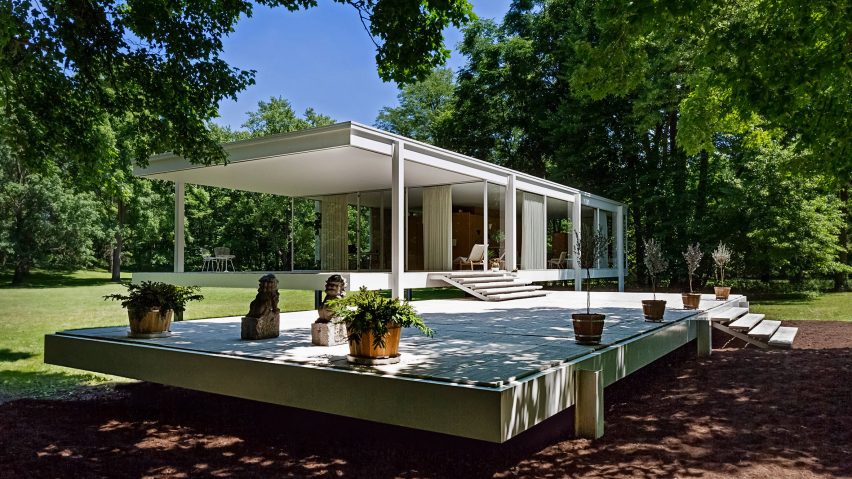Farnsworth House, the glass house designed by Mies van der Rohe in Illinois, has been redecorated for an installation to feature furnishings and personal belongings of its original client Edith Farnsworth.
Edith Farnsworth's Country House is the centrepiece of an exhibition series called Edith Farnsworth Reconsidered that explores the house's namesake.
The installation marks the first time in over 50 years the all-glass residence raised above ground by pilotis is furnished with Farnsworth's original decor.
"The Farnsworth House is known around the world as Mies's 'gesamtkunstwerk' (total work of art), but that's a false history and one that largely ignores the home's namesake, Dr Edith Farnsworth," said Farnsworth House executive director Scott Mehaffey.
For the installation the Farnsworth House and the National Trust for Historic Preservation referenced old photographs of the space taken by Hedrich-Blessing, André Kertész and Werner Blaser. These date back to when Farnsworth occupied it to replicate the design of the space as it would have appeared in 1955.
Farnsworth, a celebrated research physician, commissioned Van der Rohe to design the country house completed along the Fox River, in Plano, Illinois in 1951.
While Farnsworth lived there in the 1950s to 60s the house was decorated with her preferred taste of Scandinavian and Italian furniture from designers such as Florence Knoll, Jens Risom, Bruno Mathsson and Franco Albini and with Asian antiques.
In 1970 the residence was sold to British real estate mogul Baron Peter Palumbo, who outfitted the house with pieces by Van der Rohe and his grandson, Dirk Lohan. These are the furnishings typically on display in the space.
"For Edith Farnsworth, it was a weekend house – for Peter Palumbo, it was an architectural monument: two fundamentally different viewpoints," Mehaffey said.
"So through this installation, we experience the Farnsworth House as the client actually occupied the space – and I think this gives us a much better sense of who she was as a person, and what the house meant to her."
In the main living area, which opens out to the two lifted terraces, there is a wood dining table with white metal legs, a black and white rug with a geometric pattern and two curvy lounge chairs with woven straps.
The centre of the house is occupied by a large rectangular structure used to divide the space and house its mechanics and two bathrooms. One length of the volume is fronted with the kitchen, while the opposite side is furnished with a daybed and chairs that face a small fireplace.
The bedroom is located at one end of the wood volume and is partitioned by an office tucked into the corner of the house.
A glass desk with crossed legs overlooks the green landscape in the workspace. On top of the work surface there is a replica of Farnsworth's typewriter, a framed family photograph and books and on the ground next to the table is her medical briefcase.
Most of the furnishings on display are commercially-sold reproductions of Farnsworth's original pieces, while the wardrobe, daybed and Asian slipper chairs are custom-built replicas.
In addition to the furniture pieces the installation also showcases personal belongings Farnsworth is known to have owned, including potted plants, dish ware, linens, a violin, and a typewriter.
"We've personalised the installation with replicas of her violin, her typewriter, her books, family photos, monogrammed towels and other personal effects – to help conjure her presence," Mehaffey said.
Edith Farnsworth Reconsidered and its components will continue through December 2021 with a VR tour and a number of other programmes in the on-site galleries, including an exhibition that focuses on Farnsworth's life, career and hobbies.
"Related programmes and events will also celebrate Edith Farnsworth's life and times," Mehaffey added. "All of this places the Farnsworth House in a broader, richer context than ever before – it's no longer 'All about Mies.'"
The Farnsworth House opened to the public in 2004 and was designated a National Historic Landmark in 2006.
To highlight the house's unusual geometries and history Iker Gil and Luftwerk projected red lasers across the building and surrounding property. In 2014 there was a proposal to lift the structure with hydraulic jacks to avoid the region's flooding, however, the system was never implemented.
Photography is by William Zbaren.

